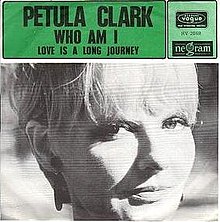
Petula Sally Olwen Clark, CBE is an English singer, actress, and composer. She has one of the longest serving careers of a British singer, spanning more than seven decades.

"Downtown" is a song written and produced by Tony Hatch. The 1964 version recorded by Petula Clark became an international hit, reaching number one on the Billboard Hot 100 and number two on the UK Singles Chart. Hatch received the 1981 Ivor Novello award for Best Song Musically and Lyrically.
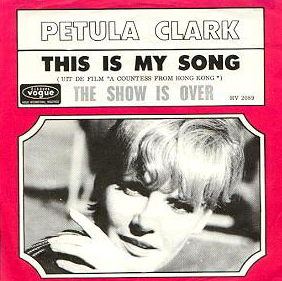
"This Is My Song" is a song written by Charlie Chaplin in 1966, and performed by Petula Clark.
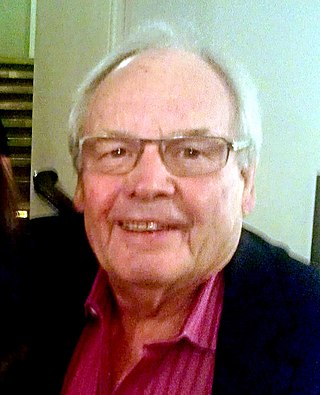
Anthony Peter Hatch is an English composer for musical theatre and television. He is also a songwriter, pianist, arranger and producer.

"My Love" is a 1965 single release by Petula Clark which, in early 1966, became an international hit, reaching No. 1 in the US: the track continued Clark's collaboration with songwriter and record producer Tony Hatch.
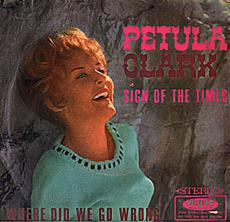
"Sign of the Times", also known as "A Sign of the Times", is a song performed by Petula Clark and released from her album My Love in March 1966. It was the follow-up to her #1 US hit "My Love," which had been the title selection from the aforementioned album, and it continued her association with writer/producer Tony Hatch and songwriter Jackie Trent. However, "A Sign of the Times" had a more percussive sound than had been evident on Clark's previous singles, or than would become evident on her later ones. Clark discussed the song with Carl Wiser for Songfacts.com in 2013. "I loved it. It had a slightly different feel. 'A Sign of the Times,' I suppose you might expect some big political statement or something, but it was just a straight-ahead love song. I think Tony rather liked finding titles that made you think, like 'Don't Sleep in the Subway.' People would think, is it about drugs? Is it about this? And these were just straightforward songs. I like 'Sign of the Times.' I think it's a good song."

"I Know a Place" is a song with music and lyrics by Tony Hatch. It was recorded in 1965 by Petula Clark at the Pye Studios in Marble Arch in a session which featured drummer Bobby Graham and the Breakaways vocal group.

"I Couldn't Live Without Your Love" is a 1966 single written by Tony Hatch and Jackie Trent and recorded by Petula Clark. It was inspired by the affair the songwriters were having at the time. Clark has cited "I Couldn't Live Without Your Love" along with "Don't Sleep in the Subway" as her favorites of her hits. “I still love that one; I do it onstage with great joy,” Clark told the "Montreal Gazette" in 2017.

"Colour My World" is a song written by Tony Hatch and Jackie Trent, and recorded by Petula Clark in 1966.

"Don't Sleep in the Subway" is a song written by Tony Hatch and Jackie Trent and recorded by British singer Petula Clark, for whom it was an April 1967 single release.
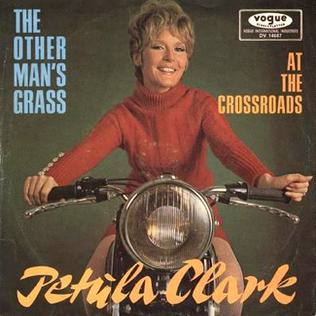
"The Other Man's Grass Is Always Greener" is a song written by Tony Hatch and Jackie Trent which was a 1967-68 hit for Petula Clark.

"You're the One" is a song by Petula Clark with lyrics by Tony Hatch, recorded in 1965. It was later also included on the 1965 album I Know a Place. "You're the One" was a Top 30 hit on the UK Singles Chart for Clark, but was more successful as a top ten US single release by The Vogues.

I Know a Place is the second album release by Petula Clark, which in the USA charted at #42. In the UK, the album was released as The New Petula Clark Album, a name which was dropped during later re-releases to prevent confusion among record-buyers.

My Love is an album released by Petula Clark; her first album to feature recording done in the United States, My Love was produced, arranged, and conducted by Tony Hatch. In the US, it was her fourth album licensed to Warner Bros. Records. After the single release of "A Sign of the Times" charted, new pressings of the album were titled A Sign of the Times/My Love.

I Couldn't Live Without Your Love is a Petula Clark album released in the United States and the UK in September 1966. Clark's fifth US album release, I Couldn't Live Without Your Love was the first Petula Clark album to include creative personnel besides Tony Hatch, who produced the album and arranged some of the tracks, along with Johnny Harris.
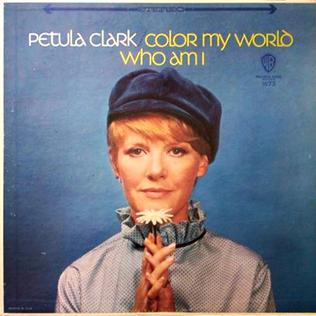
Colour My World is the sixth album released by Petula Clark in the US on Warner Bros. Records. It combines cover versions of popular songs of the era and original material, much of it written by Clark and Tony Hatch, who produced the recording and arranged it along with Johnny Harris and Frank Owens.

The Other Man's Grass Is Always Greener is the ninth album released by Petula Clark in the United States. It entered the Billboard 200 on February 17, 1968 and remained on the charts for 23 weeks, peaking at #93. It fared better in the United Kingdom, where it reached #37.

"Kiss Me Goodbye" is a Les Reed/ Barry Mason composition recorded in 1968 by Petula Clark.

Petula is a 1968 Pye Records album release by Petula Clark leased to Warner Bros. in the USA.
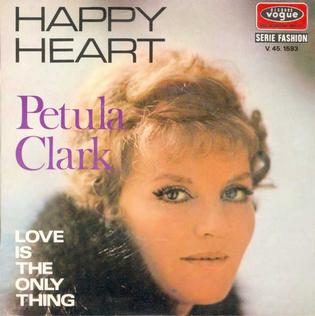
"Happy Heart" is a song written by James Last and Jackie Rae. Versions of the song by Petula Clark and Andy Williams charted simultaneously in 1969 and had their best showings on Billboard magazine's Easy Listening chart, where Clark peaked at number 12 and Williams spent two weeks at number 1.
